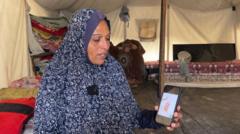In the aftermath of conflict in Gaza, families are left to swing between hope and despair as they search for their missing loved ones among the ruins. Harrowing stories are emerging from Gaza's southern city of Rafah, where recovery teams grapple with the grim task of unearthing human remains from the debris of houses destroyed by high-explosive bombs.
Haitham al-Homs, director of Emergency and Ambulance Services in Rafah, reported that since Israeli forces withdrew from the area, the agency has received approximately 150 calls from families inquiring about the whereabouts of their missing relatives. The Palestinian health authorities estimate that around 10,000 individuals are currently unaccounted for.
Residents like Osama Saleh have confronted unimaginable horror, discovering remains upon returning to their homes after the ceasefire. Saleh recounted finding a fractured skeleton, left to decay for months. "We are humans with feeling…I can't convey to you how miserable the tragedy is," he expressed, highlighting the psychological toll the events have taken on those who sift through the remains of their neighborhoods.
In funerary contexts, families visit the local hospitals to identify remains, often through clothing and personal belongings found alongside bones. Zaki, a relative searching for his missing nephew Abdul Salam al-Mughayer, faced the gut-wrenching task of confirming his identity through recovered items in a body bag. "It's 99% certain the body is his," stated a hospital worker, underscoring the painful reality of mourning a loved one amid stark uncertainties.
The loss of innocent lives reverberates through personal stories of families torn apart by violence. One particularly heart-wrenching account involves 13-year-old Aya al-Dabah, who was shot by a sniper while residing in a school with her family and hundreds of refugees. Her mother, seeking to protect her, had hoped to recover her remains for a dignified burial but instead faced the anguish of learning that her daughter's remains had been scattered.
"I couldn't understand how my daughter was taken out of her grave, and how did the dogs eat her?" her mother lamented, expressing the unrelenting grief that many parents in Gaza now experience. Like Aya's family, many others grapple with overwhelming sorrow that merges with questions of "what could have been done differently?"
The continuing search for missing persons and the harrowing discovery of remains are ongoing reminders of the tragic consequences of conflict in Gaza. As civilians navigate through their grief while searching for answers, the weight of their loss is compounded by a broader humanitarian crisis that complicates their journey towards closure. The walls of destroyed homes continue to whisper untold stories of life cut short, leaving a community to navigate their shattered hopes together in the aftermath of tragedy.


















